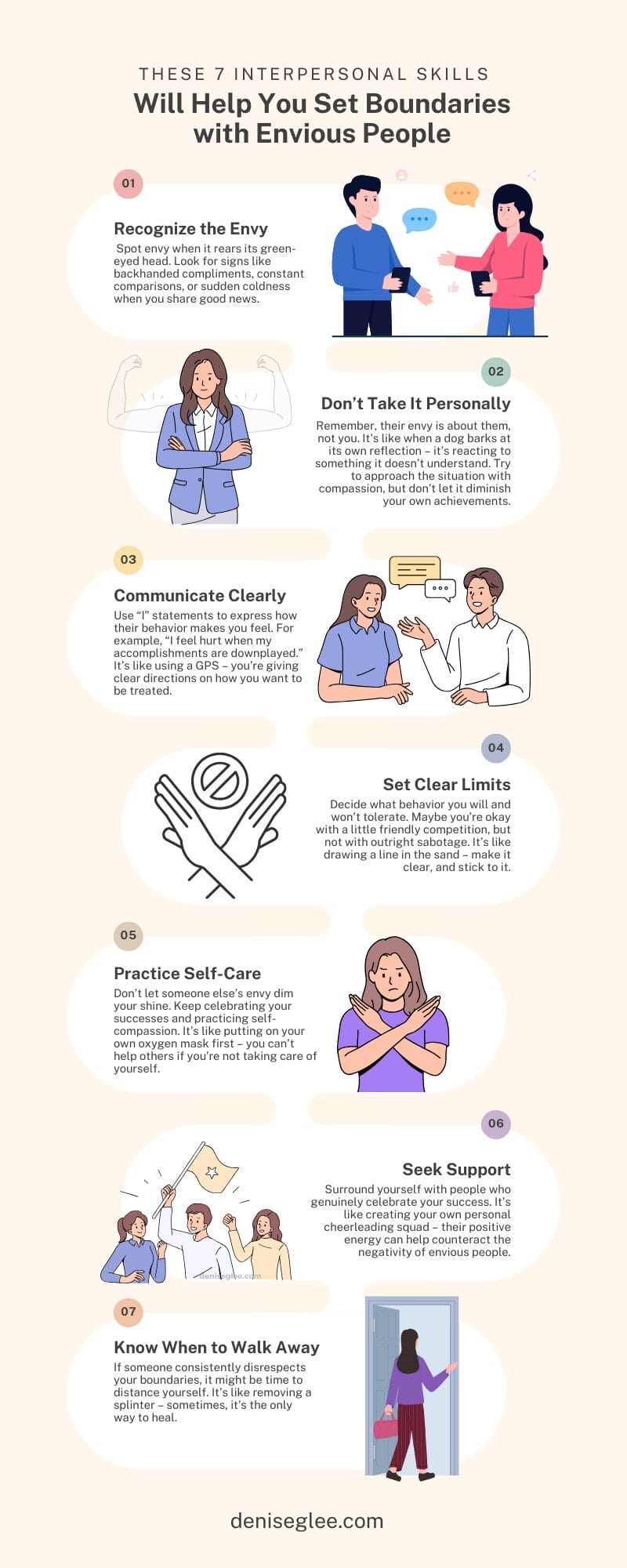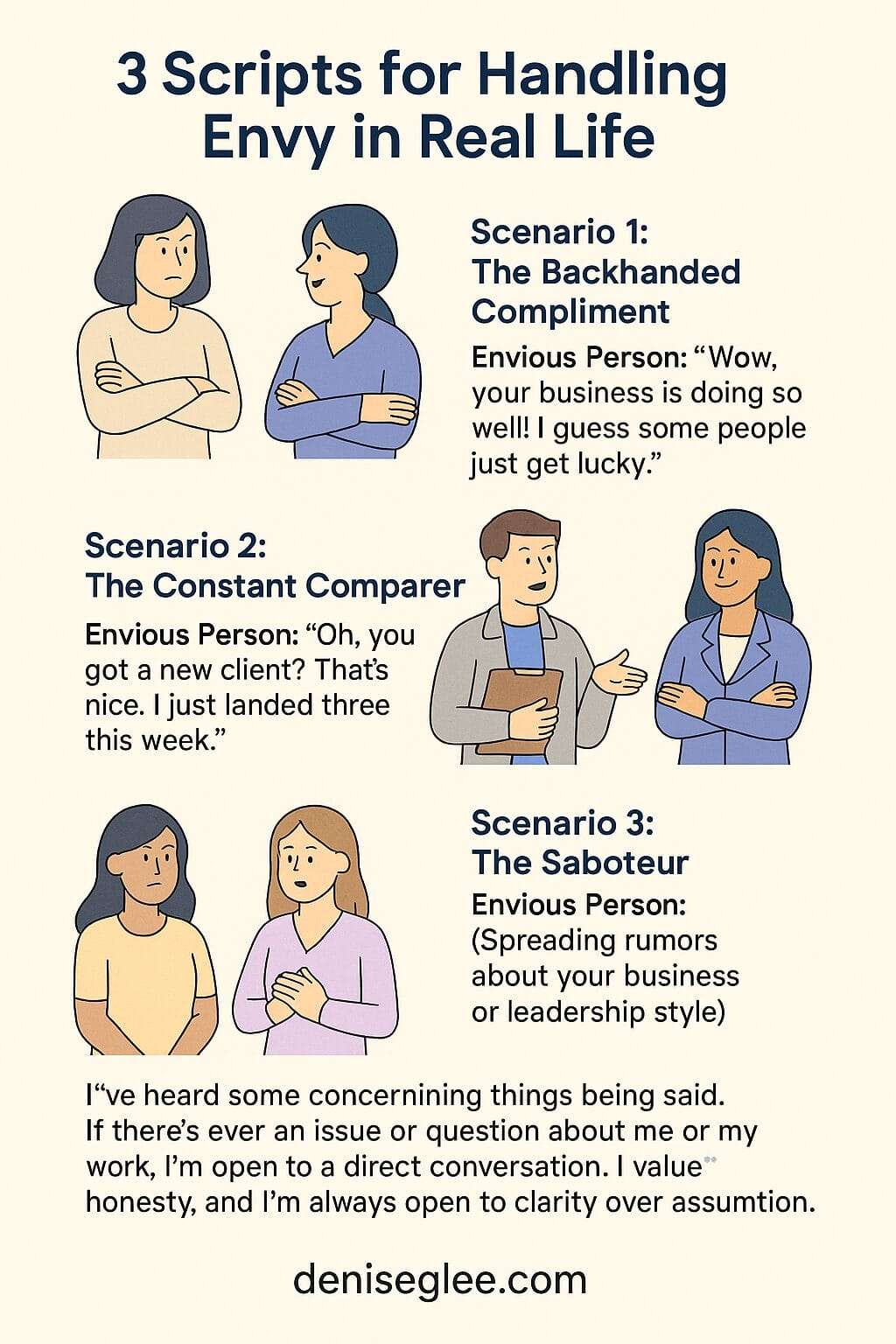- Updated: April 25, 2025
Dealing with envious people isn’t just uncomfortable—it’s confusing. One minute you’re sharing good news, the next you’re questioning whether you should’ve said anything at all. As a coach, I’ve seen how envy—especially the quiet, backhanded kind—can throw even the strongest leaders off balance.
In this article, we’ll go deeper than surface-level advice. You’ll learn how to recognize the subtle signs of envy, set boundaries without guilt, and stay anchored in your confidence—even when others try to chip away at it.
Whether it’s a colleague, a peer, or someone close to you, this guide will help you handle envy with strength and clarity—so you can lead without apology.
✨ Your Boundary-Setting Map
Why Envy Is a Leadership Issue—Not Just a Personal One
Let’s get real for a second. As a leader or business owner, you’re probably crushing it in your field. You’re making waves, climbing mountains, and maybe even inventing new mountains to climb. But here’s the thing – success often comes with a side of envy from others. It’s like ordering a delicious pizza and finding out it comes with a topping of jealous stares. Not exactly what you ordered, right?

The Hidden Cost of Letting Envy Go Unchecked
Envious people don’t always show up loudly—but when left unaddressed, it chips away at your confidence, clarity, and peace of mind. It can turn small interactions into emotional landmines and make you second-guess the very qualities that once felt like strengths.
You may notice the shift: passive-aggressive comments, cold shoulders when you succeed, or subtle digs masked as “helpful feedback.” And while it’s tempting to brush it off, the cost of staying silent is high.
Here’s why boundaries aren’t just helpful—they’re essential:
-
Protect Your Peace. Chronic exposure to envy—especially the subtle, manipulative kind—can wear you down mentally and emotionally. Boundaries create a buffer that keeps you grounded and sane.
-
Stay Focused. Envy is distracting. When you’re dodging shade or navigating unspoken tension, it’s hard to stay present in your work. Boundaries cut the noise so you can focus on what actually matters.
-
Preserve the Relationship (When Worth Saving). Not every envious person is malicious—sometimes it’s someone you care about. Boundaries make space for the relationship to reset or recalibrate.
-
Lead by Example. When you model self-respect, others take notice. Your team, your peers, and even the envious person learn what emotional maturity looks like in action.
-
Protect Your Energy from Leaks. Time spent managing drama is time stolen from vision, strategy, and impact. Boundaries plug the leaks so your energy goes where it’s supposed to.
This isn’t about being rigid or superior—it’s about staying rooted when other people’s insecurity tries to pull you off balance. And the more rooted you are, the more clarity and courage you bring to your leadership.
The Psychology of Envy: Why It Feels Personal (But Isn’t)
Now, let’s put on our lab coats and dive into the science of envy. Don’t worry, I promise not to make this sound like a boring textbook!

Envy isn’t just an ugly emotion—it’s a painful one. It often shows up as a mix of admiration, insecurity, resentment, and longing. It’s not always easy to spot, but when it takes hold, it can distort relationships and cloud even the most supportive environments.
Dr. Richard Smith, a leading researcher on envy, defines it this way:
“Envy occurs when a person lacks another’s superior quality, achievement, or possession and either desires it or wishes that the other lacked it.”
But here’s the part most people don’t realize: scientific studies have shown that envy activates the same areas of the brain associated with physical pain. In other words, for the person experiencing envy, it literally hurts.
That pain is often what drives the strange, passive-aggressive behaviors we experience: sarcasm, withdrawal, gossip, or subtle sabotage. When we understand that, it doesn’t mean we excuse the behavior—but we do gain insight. And from insight, we gain power: the power to respond with calm, rather than defensiveness.
The 5 Faces of Envy (and How to Spot Each One)
Not all envy looks the same. Some envious people lash out. Others quietly withdraw. And if you’re not paying attention, it’s easy to misread the signs—and respond in ways that make things worse.
Here are five common patterns of envious behavior I see in both personal and professional spaces:

1. The Silent Sulker
They won’t confront you directly, but the energy shift is real. Cold shoulders. Passive-aggressive comments. Long pauses after good news. Their silence isn’t neutral—it’s loaded.
2. The Constant Comparer
With this person, everything turns into a scoreboard. You share a win—they one-up you. You mention a struggle—they’ve had it harder. It’s not connection they’re after. It’s control.
3. The Saboteur
This one’s more overt. They’ll gossip, undermine your credibility, or plant doubt behind your back. Whether it’s jealousy or fear driving them, their goal is the same: to disrupt your momentum.
4. The Green-Eyed Friend
They were kind… until you started leveling up. Now their “concern” feels loaded, and their support comes with disclaimers. These dynamics can be the hardest to navigate—because part of you still wants to believe they’re on your side.
5. The Copycat
They mimic your work, your voice, your style—but without acknowledgment or relationship. It’s less about inspiration, more about replication. And over time, it starts to feel invasive.
Recognizing these patterns isn’t about labeling people—it’s about protecting your peace. Once you spot the behavior, you can choose a boundary strategy that meets the moment. Some people can grow when called in. Others need distance. Either way, you’re in the driver’s seat.
7 Skills to Set Boundaries with Envious People
Envy has a way of making even ordinary conversations feel tense. One minute you’re sharing a win, and the next, you’re met with silence, sarcasm, or subtle digs. If you’re not prepared, it can throw you off emotionally—and drain your energy fast.
Here’s how to stay grounded, even when envy tries to knock you sideways:

1. Recognize the Envy
Notice the shift. Are you being met with backhanded compliments, constant comparisons, or cold silence after you share something positive? These aren’t random—they’re signals. Once you can spot them, you’re less likely to personalize them.
2. Don’t Take It Personally
Envy isn’t a reflection of your worth—it’s a reaction to someone else’s internal conflict. That doesn’t mean you excuse bad behavior, but it does mean you don’t internalize it. Stay rooted in your truth, not their projections.
3. Communicate Clearly
If something crosses a line, speak up without escalating. Use calm “I” statements:
“I feel hurt when my accomplishments are dismissed.”
This keeps you in integrity—and sets the tone for how you expect to be treated.
4. Set Clear Limits
Boundaries aren’t about punishing others—they’re about protecting your peace. Decide what’s acceptable and what’s not. Be direct, be kind, and hold the line without guilt.
5. Practice Self-Care
You’re allowed to celebrate your success. You don’t need to shrink to keep others comfortable. Make space for joy, rest, and reflection—especially when you’re navigating emotional friction.
6. Seek Support
You don’t have to navigate envy alone. Whether it’s a friend, coach, or mentor, having someone who validates your experience can make a huge difference. Stay connected to people who see you.
7. Know When to Walk Away
If the pattern repeats—even after honest communication and clear boundaries—it may be time to step back. You don’t need to explain your peace. Sometimes walking away from envious people is the most self-respecting choice you can make.
The image below sums up my tips. Next, let’s talk about how to handle envious behavior in action.

3 Scripts for Handling Envy in Real Life
When someone tries to rattle your confidence with envy, it’s easy to feel thrown off—or tempted to shrink. But you don’t have to match their energy. The goal isn’t to outdo them. It’s to stay rooted in who you are.
Here are three real-world scenarios, along with grounded, emotionally clear ways to respond:

Scenario 1: The Backhanded Compliment
Them: “Wow, your business is doing so well! I guess some people just get lucky.”
You: “Thanks—I really appreciate that. My team and I have put in a lot of effort to get here. If you’re curious, I’m happy to share what helped us grow.”
💡 Why it works: You acknowledge their comment without internalizing the jab—and you stay generous without being defensive.
Scenario 2: The Constant Comparer
Them: “Oh, you got a new client? That’s nice. I just landed three this week.”
You: “Congrats—that sounds like a big win for you! I’m really proud of the work I’m doing with my new client too. Wins all around.”
💡 Why it works: You don’t get pulled into the comparison game. You celebrate both wins without letting them steal your joy.
Scenario 3: The Saboteur
Them: (Spreading rumors about your business or leadership style)
You: “I’ve heard some concerning things being said. If there’s ever an issue or question about me or my work, I’m open to a direct conversation. I value honesty, and I’m always open to clarity over assumption.”
💡 Why it works: You remain direct and emotionally mature. You don’t attack, but you also don’t let misinformation slide.
Responding to envy with grace takes practice. You won’t always get it perfect—and you don’t have to. But the more you practice holding your ground, the less someone else’s insecurity can shake you.

Frequently Asked Questions About Envious People
How do I deal with someone who gets jealous every time I succeed?
Start by recognizing the pattern. If someone consistently minimizes your wins, sets up competition, or makes subtle digs—it’s not a fluke. You don’t need to shrink to keep them comfortable. Set limits and share less if their envy turns toxic.
Can I keep a relationship with someone who’s envious of me?
It depends. If they’re willing to grow and take ownership, there’s hope. But if they deflect, criticize, or sabotage you when you’re doing well, distance might be the most loving thing you can do—for both of you.
How do I set a boundary without sounding arrogant or cold?
Use “I” statements and stay grounded in your truth. For example: “I need to protect my energy and stay focused right now, so I’m limiting these conversations.” You’re not being rude—you’re being responsible.
Why does envy hurt so much—especially when it comes from someone close?
Because it feels like rejection in disguise. Envy from a loved one can make you second-guess your joy. That’s why it’s so important to name it, feel it, and protect your peace.
You Don’t Have to Shrink to Stay Safe: Final Thoughts
If envy has been draining you—quietly or dramatically—you’re not imagining it. Setting boundaries with envious people isn’t just a leadership skill. It’s emotional protection. And yes, it can be uncomfortable. But shrinking to stay safe isn’t the answer. It never was.
You’re not responsible for managing other people’s discomfort with your growth. You are, however, responsible for protecting your energy, honoring your values, and showing up for your life with clarity and compassion.
Your success is not someone else’s failure.
The people who are meant to walk with you will celebrate you, not compete with you. And when they don’t? Boundaries are how you stay rooted in your power.
If you’re ready to stop performing and start healing—for real—I’d be honored to support you.
💛 Work with me, Denise G. Lee – Together, we’ll untangle the deeper patterns holding you back and create clear, practical strategies that match you. No hype. No formulas. Just honest, personalized support.
👉 Explore working together
🎙️ Want more real talk like this?
Listen to my podcast for unfiltered conversations on emotional growth, leadership, and the truth about healing in business and life.
👉 Introverted Entrepreneur – wherever you stream
💌 Got thoughts or questions about this article?
I’d love to hear from you.
👉 Write me a note
And just in case no one’s reminded you lately:
Leadership isn’t about being perfect.
It’s about being present. Being willing.
Showing up with your scars, not just your strengths.
That’s what makes it powerful.
That’s what makes it real.




